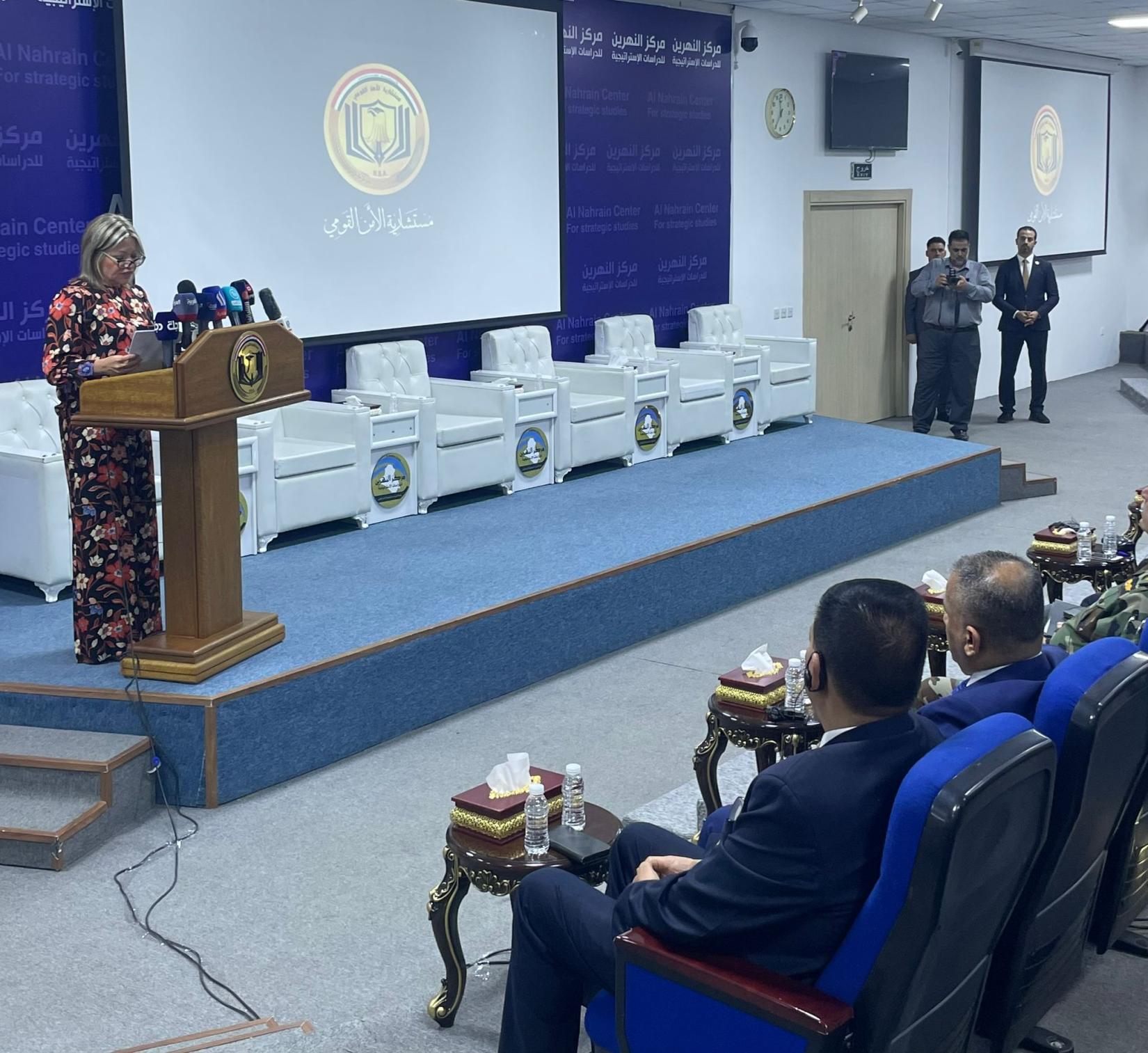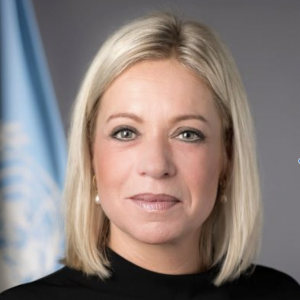Event: “Iraq’s Vision on Al-Houl Camp in Syria”
12 June 2023
Baghdad

Excellencies,
Ladies and gentlemen,
Good morning,
Sabah el kher
Ever since taking up my position in December 2018, the camps and prisons in North-eastern Syria have been front and centre in my engagements. Why? Because leaving the situation unaddressed was (and still is) not an option.
Now - the legacy of yesterday’s fight against Da’esh is undoubtedly a complex one. But one that we must tackle, together. We have a collective duty to prevent it from turning into tomorrow’s war.
Over the past four years, you have heard me repeat that we should not wait for young children to come of age in a camp like Al-Hol.
These children never asked to be part of this mess. But the harsh reality is that they find themselves deprived of their rights. Also, they find themselves at risk of forced recruitment; of violent extremism becoming their ‘normal’.
Ladies and gentlemen,
It is a humanitarian issue. It is a security issue.
And Iraq’s National Security Advisor, Mr. Qasim al-Araji, understands – as no other could – that keeping people indefinitely in these restricted and extremely poor conditions ultimately creates greater protection and security risks than taking them back in a controlled manner.
In April last year, The National Security Adviser just referred to it, I delivered an address at this very same centre. At that time, 449 households had returned from Al-Hol camp. Since then, Iraq has managed to more than triple this number, with the return of 1,382 households to Jeddah Centre. Meanwhile, a further 837 households have departed to their areas of origin or return.
Iraq’s efforts in past years have not been easy. Far from it. And, they have entailed much ‘learning by doing’. And...as is the case in any country with nationals in Al-Hol, opposition is also part of Iraq’s reality.
That said, the process of returning nationals is the right thing to do – for Iraq, for any country which has its nationals in Al-Hol. And I can only repeat that leaving the situation unaddressed is simply not an option. No matter the challenges, it has to be done.
The risks associated with doing nothing or too little are abundantly clear. Also, a camp like Al-Hol continues to fuel resentment and serves as a source of inspiration for terrorists.
Now - as Iraq has shown us: dignified solutions anchored in the principles of both accountability and reintegration are possible. And we have no time to lose. What I am saying is: the best and only durable solution is to control the situation, and thus to manage returns swiftly and decisively - in the spirit of partnership.
Last year, on 5 June to be precise, I visited Al-Hol myself. A desolate, sprawling complex of tents in the scorching sun.
A conversation with an 11-year-old Iraqi boy will be etched on my memory forever. His father had died some years prior, most likely on the battlefield. His mother had passed away because of illness. He and his six siblings were on their own, trying to survive in a camp like Al-Hol.
The boy had only one dream: to return to Iraq. To return to the places his mother had told him about. To have a life worth living. I was struck by his humble aspiration, his determination. Eleven years old. Better no life, than this life - he said. And he was right.
In early January of this year, UNHCR and UNICEF informed me about the departure of this boy, and his siblings, from Al-Hol – back to Iraq. They had made it out. But, as we all know: thousands of Iraqis, as well as other nationals, are still there.
Now - Iraq’s authorities do realize they cannot stop here. They made that crystal clear. Many times. Including during the visit of UN Secretary-General António Guterres in early March.
We also know that there is much work left to do. As I said, thousands of Iraqis are still out there.
And let’s face it, a clearance for return to Iraq is only the beginning of a journey. From arrival in Jeddah Centre to onward departure to areas of return…another long road awaits, similarly packed with challenges.
While a speech might not be the best moment to go into the weeds of things, let me mention a few issues to be taken into account:
- There is an urgent need for seamless coordination among all Iraqi governmental entities involved, particularly between both civilian and security counterparts, including in camp management and coordination, and the clearance of departures from Jeddah Centre as well as in the promotion of reintegration.
- The unique vulnerabilities of many of the returnees, specifically women and children and people with disabilities, must be taken into account. For instance, and as I mentioned earlier, there are unaccompanied or separated children whose specific needs must be met. This requires an informed approach, driven by relevant needs and rights.
- With reintegration as the ultimate objective, adequate transitional services are a prerequisite at Jeddah Centre, and beyond. These include health and mental health care, or education and vocational training – as well as the basics, from cooking equipment to clothing.
- Returnees must have accessible pathways to legal identity and other civil documentation. Without official papers, returnees will simply not succeed in setting up their lives and reintegrating.
- Also, returnees should be normalized into the Government’s social protection system as any other vulnerable Iraqi would be. Otherwise, they will be at risk of falling into extreme poverty and finding themselves exposed to other social ills.
- Maintaining the family unit is, of course, equally critical.
- And, social cohesion, and thus the need to communicate, clearly and inclusively, with communities in areas of return is a precondition to successful reintegration. Work is required to dispel and prevent dis- and mis-information campaigns.
- We must further ensure that unmet demands for justice do not spark a groundswell of anger. So yes, I also want to flag the need for accountability and justice. The victims of Da’esh deserve no less. Moreover, accountability and justice are key mechanisms for prevention.
Ladies and gentlemen,
Iraq has an ambitious vision. One that involves completing dignified returns, pursuing accountability, and healing the deep wounds inflicted on communities.
This vision can be achieved if all involved are talking to each other; if all are working together to plug gaps; and if all resources and expertise are being pooled. In other words, it requires all-of-Iraq efforts.
And that is exactly why we, the United Nations in Iraq, are in the process of developing an all-of-UN approach to support the Government’s leadership and efforts in this endeavour.
As we all know: Iraq’s caseload is enormous. And while we expect Iraqi authorities to lead on these efforts and do what is right, we have (as I said) a collective duty to prevent the legacy of yesterday’s fight from turning into tomorrow’s war.
Hence, I express hope that the international community remains committed to supporting Iraq, by taking back its own nationals, but also, first and foremost, in its immense task ahead. It is actually quite simple: if Iraq succeeds, we will all benefit.
Thank you.
Speech by


